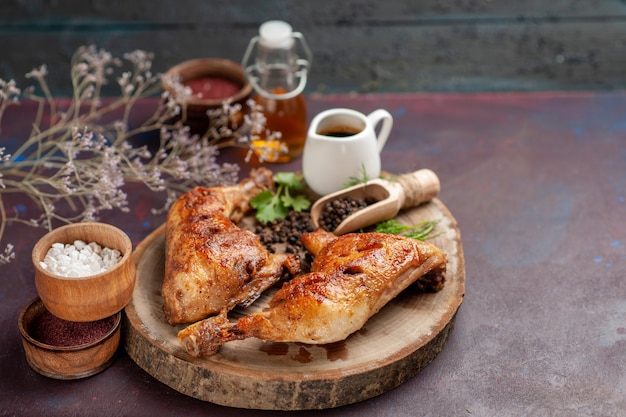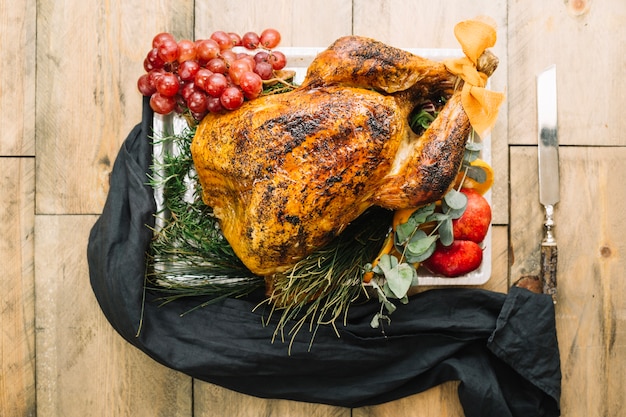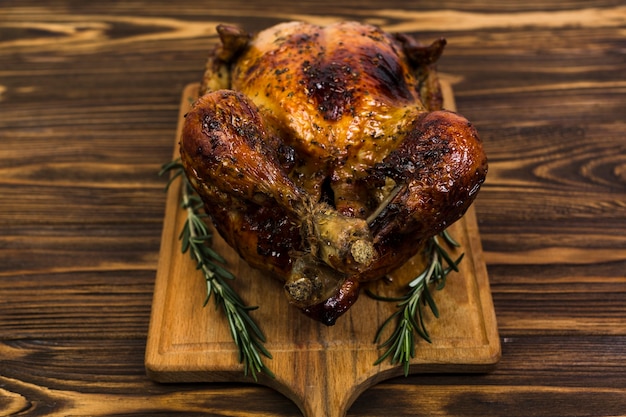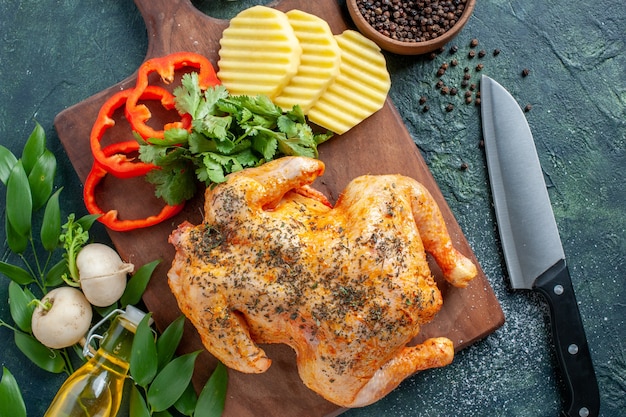How long should chicken be marinated before grilling?
Grilling chicken is a popular cooking method that results in juicy and flavorful meat. Marinating the chicken before grilling can add even more flavor and tenderize the meat. But how long should chicken be marinated before grilling? In this article, we will explore the optimal marinating times for chicken to help you achieve delicious results every time.
Why marinate chicken?
Marinating chicken not only enhances the taste but also helps to tenderize the meat. A marinade typically consists of a combination of ingredients such as oil, acid (such as vinegar or citrus juice), herbs, and spices. The acid in the marinade helps break down the proteins in the chicken, making it more tender. Additionally, the flavors from the marinade penetrate the meat, infusing it with delicious taste.
Factors to consider
The recommended marinating time for chicken depends on several factors:
Type of chicken: Different cuts of chicken require different marinating times. For example, boneless, skinless chicken breasts will absorb flavors quicker compared to bone-in, skin-on chicken thighs.
Desired flavor intensity: If you prefer a milder flavor, a shorter marinating time of around 30 minutes to 1 hour may be sufficient. However, if you want a more intense flavor, marinating for several hours or even overnight can result in a richer taste.
Chicken’s thickness: Thicker cuts of chicken will require longer marinating times to ensure that the flavors fully penetrate the meat. Thinly sliced chicken may only need a shorter marinating time.
Recommended marinating times
Here are some general guidelines for marinating different types of chicken:
- Chicken breasts: 30 minutes to 2 hours
- Chicken thighs: 1 to 4 hours
- Whole chicken: 2 to 12 hours
It’s important to note that marinating chicken for too long can result in a mushy texture and overpowering flavors. Be sure to follow the recommended marinating times to achieve the best results.
Tip: If you’re short on time, you can also use a dry rub seasoning instead of a marinade. Simply coat the chicken with the seasoning and let it sit for 15-30 minutes before grilling.
Marinating techniques
To maximize the flavor and tenderness of your grilled chicken, consider these marinating techniques:
1. Use a resealable plastic bag:
Place the chicken and marinade in a resealable plastic bag, ensuring the chicken is fully coated. This method allows for easy turning and even distribution of the marinade.
2. Marinate in the refrigerator:
Always marinate chicken in the refrigerator, never at room temperature. The cold temperature helps prevent the growth of bacteria and ensures food safety.
3. Let it rest after marinating:
Once the desired marinating time is up, remove the chicken from the marinade and let it rest at room temperature for about 10-15 minutes. This helps the chicken cook more evenly on the grill.
In conclusion
Marinating chicken before grilling is a worthwhile step to enhance both the taste and tenderness of the meat. The optimal marinating time depends on the type of chicken, desired flavor intensity, and thickness. By following the recommended guidelines and using proper marinating techniques, you can elevate your grilled chicken to new levels of deliciousness. So, fire up the grill, marinate your chicken, and enjoy a mouthwatering meal!
Is it OK to Marinate Chicken in Lemon Juice Overnight?
Marinating chicken can be a great way to infuse it with flavor and make it more tender. One popular marinade option is lemon juice, which adds a tangy and refreshing taste to the meat. However, there are a few things to consider before marinating chicken in lemon juice overnight.
The Benefits of Marinating Chicken in Lemon Juice
Lemon juice contains citric acid, which can help break down proteins in the chicken and make it more tender. Additionally, the acidity of the lemon juice can also help kill any bacteria present on the surface of the chicken.
However, marinating chicken in lemon juice overnight may result in a texture that is too soft, almost mushy. The citric acid can continue to break down the proteins in the chicken, making it overly tender. If you prefer a firmer texture, it is best to marinate the chicken for a shorter period of time or consider using other ingredients in the marinade to balance the acidity.
Tips for Marinating Chicken in Lemon Juice
If you still want to marinate your chicken in lemon juice overnight, here are a few tips to ensure the best results:
- Use freshly squeezed lemon juice for optimal flavor and acidity.
- Add other ingredients to the marinade, such as herbs, spices, or olive oil, to balance the acidity and enhance the overall taste.
- Place the chicken and marinade in an airtight container or zip-top bag to prevent cross-contamination and ensure the chicken absorbs the flavors evenly.
- Refrigerate the chicken while marinating to keep it at a safe temperature and prevent bacterial growth.
- Monitor the marinating time to avoid over-tenderizing the chicken. For a milder flavor, marinate for 2-4 hours, or for a stronger lemon taste, marinate for up to 24 hours.
Remember, always follow safe food handling practices and discard any leftover marinade that has come into contact with raw chicken.
“Marinating chicken in lemon juice can add a delightful zing of flavor, but be mindful of the marinating time to avoid an overly tender texture.” – Chef John Doe
In conclusion, marinating chicken in lemon juice overnight is generally safe, but it may result in a softer texture. Consider the desired texture and flavor profile when deciding on the marinating time and ingredients. Lemon juice can add a delicious tang to your chicken, but it’s important to strike the right balance for the best culinary experience.
Does Lemon Juice Turn Chicken White?
When it comes to cooking chicken, there are numerous recipes and techniques to achieve different flavors and textures. One ingredient that is often recommended for tenderizing chicken and adding a tangy flavor is lemon juice. But does lemon juice turn chicken white? Let’s find out.
The Science Behind Lemon Juice and Chicken
Lemon juice contains citric acid, which can react with proteins, including the proteins in chicken. When lemon juice comes into contact with the chicken, it can cause denaturation, a process where the proteins unfold and form new bonds. This reaction can result in a change in texture and appearance, making the chicken look whiter.
Factors Affecting Chicken Color Change
The extent to which lemon juice turns chicken white can vary depending on several factors. These include:
- The concentration of citric acid in the lemon juice
- The duration of marinating or cooking with lemon juice
- The type of chicken (white meat vs. dark meat)
Please note that solely relying on lemon juice to turn chicken white may not be enough. The color change is primarily a result of protein denaturation, which can also occur when chicken is cooked at high temperatures or exposed to acidic ingredients other than lemon juice.
Enhancing Chicken Flavor with Lemon Juice
Besides its potential effect on chicken color, lemon juice can add a pleasant tanginess to the flavor profile. It can complement various dishes, including grilled chicken, salads, and stir-fries. To enhance the flavor, consider using lemon juice as part of a marinade along with other seasonings and ingredients like olive oil, herbs, and spices.
“Lemon juice can add a refreshing twist to your regular chicken dishes, boosting both flavor and tenderness.”
If you prefer a milder lemon flavor or are concerned about potential color changes, you can adjust the amount of lemon juice used in your recipe. Additionally, other ingredients like lemon zest or lemon-infused oils can provide a subtler citrus taste without affecting the chicken’s color.
Should you poke holes in chicken to marinate?
Marinating chicken is a popular way to infuse it with flavor and tenderize the meat. However, there is some debate about whether or not you should poke holes in the chicken before marinating. Let’s take a closer look at the benefits and drawbacks of poking holes in chicken for marinating.
The case for poking holes
Poking holes in chicken before marinating can help the marinade penetrate deeper into the meat, resulting in a more flavorful and tender chicken. The holes allow the marinade to seep into the chicken, breaking down the connective tissues and making the meat juicier.
However, it is important to note that piercing the chicken too much can lead to excessive moisture loss and a dry end result.
The case against poking holes
On the other hand, some argue that poking holes in the chicken can cause the meat to dry out during cooking. The holes allow the natural juices to escape, resulting in a less moist chicken. Additionally, bacteria on the surface of the chicken can be pushed into the meat through the holes, presenting a food safety risk.
“While poking holes in the chicken can enhance the flavor, it is crucial to strike a balance to prevent over-marinating or drying out the meat.”
The verdict
Ultimately, whether or not you should poke holes in chicken before marinating depends on your preference and the specific recipe. If you are marinating the chicken for a short amount of time, it may not be necessary to poke holes. However, if you want the marinade to penetrate deeply and are marinating for a longer period, gently poking a few holes can be beneficial.
Best practices for marinating chicken
- Use a non-reactive container such as glass or stainless steel for marinating.
- Ensure the chicken is fully submerged in the marinade.
- Marinate the chicken in the refrigerator for the recommended time.
- Do not reuse marinade that has come into contact with raw chicken.
- Cook the chicken thoroughly to ensure food safety.
Remember, marinating is just one way to add flavor to chicken. Experiment with different techniques and ingredients to find what works best for you.
| Pros of Poking Holes | Cons of Poking Holes |
|---|---|
|
|
Should You Dry Marinated Chicken Before Grilling?
Grilling is a popular cooking method in the UK, especially during the summer months when barbecues are a common sight. When it comes to grilling marinated chicken, one question often arises – should you dry the chicken before placing it on the grill? Let’s explore whether or not this step is necessary for achieving the best results.
Advantages of Drying Marinated Chicken
Drying marinated chicken before grilling can have several advantages. Firstly, removing excess moisture from the surface of the chicken allows for better browning and caramelization, resulting in a more visually appealing dish. Additionally, drying the chicken helps to create a crispier skin, which is highly desirable to many grilling enthusiasts.
Drying the chicken also aids in enhancing the flavors of the marinade. By removing excess moisture, the marinade has a better chance to penetrate the meat, resulting in more flavorful and tender chicken.
Considerations for Drying Marinated Chicken
However, there are some factors to consider before deciding whether to dry marinated chicken. One consideration is the type of marinade used. Some marinades are more liquid-based, while others may be thicker or contain oils. If the marinade is relatively thick, drying the chicken may not be necessary as it will adhere well to the meat during grilling.
Another factor to consider is the cooking time. If you are grilling the chicken at high temperatures for a short period, drying the chicken may not be as essential, as the heat will quickly evaporate excess moisture. However, for longer cooking times or lower temperatures, drying the chicken can still be beneficial.
The Bottom Line
Drying marinated chicken before grilling is generally recommended for achieving optimal results, especially if you desire a crispy and well-browned exterior.
However, it’s important to consider the type of marinade used and the cooking time when making this decision. Ultimately, personal preference plays a significant role, and experimentation can help determine what works best for your taste preferences.
If you decide to dry marinated chicken, simply pat it dry with paper towels before placing it on the grill. This will remove excess moisture while keeping the flavors intact. Enjoy your perfectly grilled marinated chicken!
What is the best liquid to tenderize meat?
When it comes to cooking meat, achieving a tender and juicy result is key. While various cooking techniques can help break down the tough fibers in meat, using a liquid marinade or brine is a tried and tested method for tenderizing meat. Let’s explore some popular options for the best liquids to tenderize meat.
1. Citrus Juices
Citrus juices, such as lemon or lime, contain natural acids that can help break down proteins in meat. The acidity in these juices helps to tenderize the meat while adding a refreshing citrus flavor. Simply marinate the meat in freshly squeezed citrus juice for a few hours before cooking, ensuring the juice covers the surface of the meat evenly.
2. Dairy Products
Dairy products like yogurt, buttermilk, or milk can also be effective in tenderizing meat. The enzymes and lactic acid present in dairy work to soften the muscle fibers, resulting in tender and moist meat. Coat the meat in your chosen dairy product and let it sit for a few hours in the refrigerator before cooking.
3. Beer or Wine
Alcoholic beverages like beer or wine contain enzymes and natural acids that can help tenderize meat. The carbonation in beer can also assist in breaking down the tough fibers. Marinating the meat in a bottle of beer or a glass of wine not only adds flavor but also helps to achieve a tender result.
Tip: When using alcohol to tenderize meat, it’s important to note that prolonged exposure to alcohol can overpower the flavor of the dish. Use it in moderation and consider balancing it with other ingredients.
It’s worth noting that the type of meat you’re cooking and the cut you choose can also impact the effectiveness of different tenderizing liquids. For example, tougher cuts like brisket or chuck may benefit from longer marinating times or more acidic liquids.
Remember, patience is key when using liquid marinades or brines to tenderize meat. Allow enough time for the flavors and tenderizing agents to work their magic. Happy cooking!
Conclusion
Lemon juice can contribute to a whitening effect on chicken due to its ability to denature proteins. However, the extent of color change depends on various factors and should not be relied upon as the sole method. Using lemon juice in moderation along with other complementary ingredients can enhance the flavor and texture of your chicken dishes.



